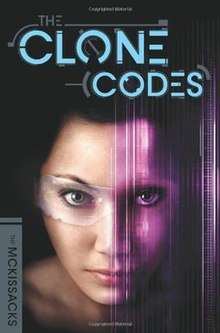The Clone Codes
The Clone Codes is a 1994 book by Patricia and Fredrick McKissack. It is about a girl, Leanna, who lives in 22nd century America where human clones and cyborgs are treated like second-class citizens, and what happens when she discovers that her parents are activists and that she is a clone.
 First edition | |
| Author | Patricia McKissack, Fredrick McKissack, John Patrick McKissack |
|---|---|
| Cover artist | Ken Choi |
| Country | United States |
| Language | English |
| Genre | Children's literature, Science fiction |
| Published | 1994 (Scholastic Press) |
| Media type | Print (hardback, paperback) |
| Pages | 184 |
| ISBN | 9780590458092 |
| OCLC | 28221299 |
Reception
Booklist, in its review of The Clone Codes, wrote "The McKissacks' slight story for younger readers packs a great deal of messaging, which will no doubt prove useful in classroom discussions of issues and themes but sometimes comes at the expense of the story. The science-fiction backdrop serves as a framework for issues of identity and societal prejudice but is not predominant in the reading experience."[1] School Library Journal's review was more critical, calling it "A clunky, didactic science-fiction allegory." and wrote "Some aspects of the plot are predictable and poorly drawn .. too many references to the distant past .. prevent the futuristic setting from coming to life." Nevertheless, it did conclude "Still, the fast pace, short chapters, and slim page count will make this volume attractive to reluctant readers, and the obvious curriculum tie-ins will appeal to teachers."[1]
The Clone Codes has also been reviewed by The Horn Book Magazine,[2] Library Media Connection,[3] Voice of Youth Advocates,[4] Kirkus Reviews,[5] Publishers Weekly,[6] The Bulletin of the Center for Children's Books,[7] and Multicultural Review.[8]
It was an Iowa Children's Choice Award nominee.[9]
References
- "The clone codes". Buffalo and Erie County Public Library. Retrieved March 19, 2017.
- "The clone codes: Reviews". catalog.wccls.org. Retrieved March 19, 2017.
Obvious historical parallels are heavy-handed and sometimes supersede the logic of the authors' future world, but the action-filled plot and sympathetic characters make this parable readily accessible.
- "The clone codes: Reviews". catalog.wccls.org. Retrieved March 19, 2017.
This story, .. demonstrates the power of well-written science fiction. .. The unresolved ending will leave readers wanting to know what happens. Highly Recommended.
- "The Clone Codes". kcls.bibliocommons.com. Retrieved March 19, 2017.
Even as some genre readers will be attracted to the action and setting and others will pick it up because of recognizable authors, this novel will certainly not attract readers through its poor construction and didacticism.
- "Clone Codes". Kirkus Media LLC. January 15, 2010. Retrieved March 19, 2017.
This is fast-paced adventure with a provocative exploration of civil rights and identity.
- "The Clone Codes". Publishers Weekly. PWxyz LLC. January 18, 2010. Retrieved March 19, 2017.
The story is tight and fast-paced, yet makes room for historical parallels that are vivid without being preachy. An intriguing start to a planned trilogy.
- April Spisak (May 2010). "The Clone Codes (review)". Bulletin of the Center for Children's Books. The Johns Hopkins University Press. 63 (9): 389. doi:10.1353/bcc.0.1719. Retrieved March 19, 2017.
The quick pace and short chapters, combined with a clear anti-discrimination message, make this an appealing choice for reluctant readers or sci-fi buffs seeking an unchallenging jaunt. .. this novel might work well as a flashy bridge into a unit on slavery, or as a quick beach read for the science-fiction set.
- "The Clone Codes". Multicultural Review. GP Subscription Publications. 19 (2): 75. June 2010. Retrieved March 19, 2017.
- "IASL Book Awards". williamsburg.lib.ia.us. Iowa Association of School Librarians. Retrieved March 19, 2017.